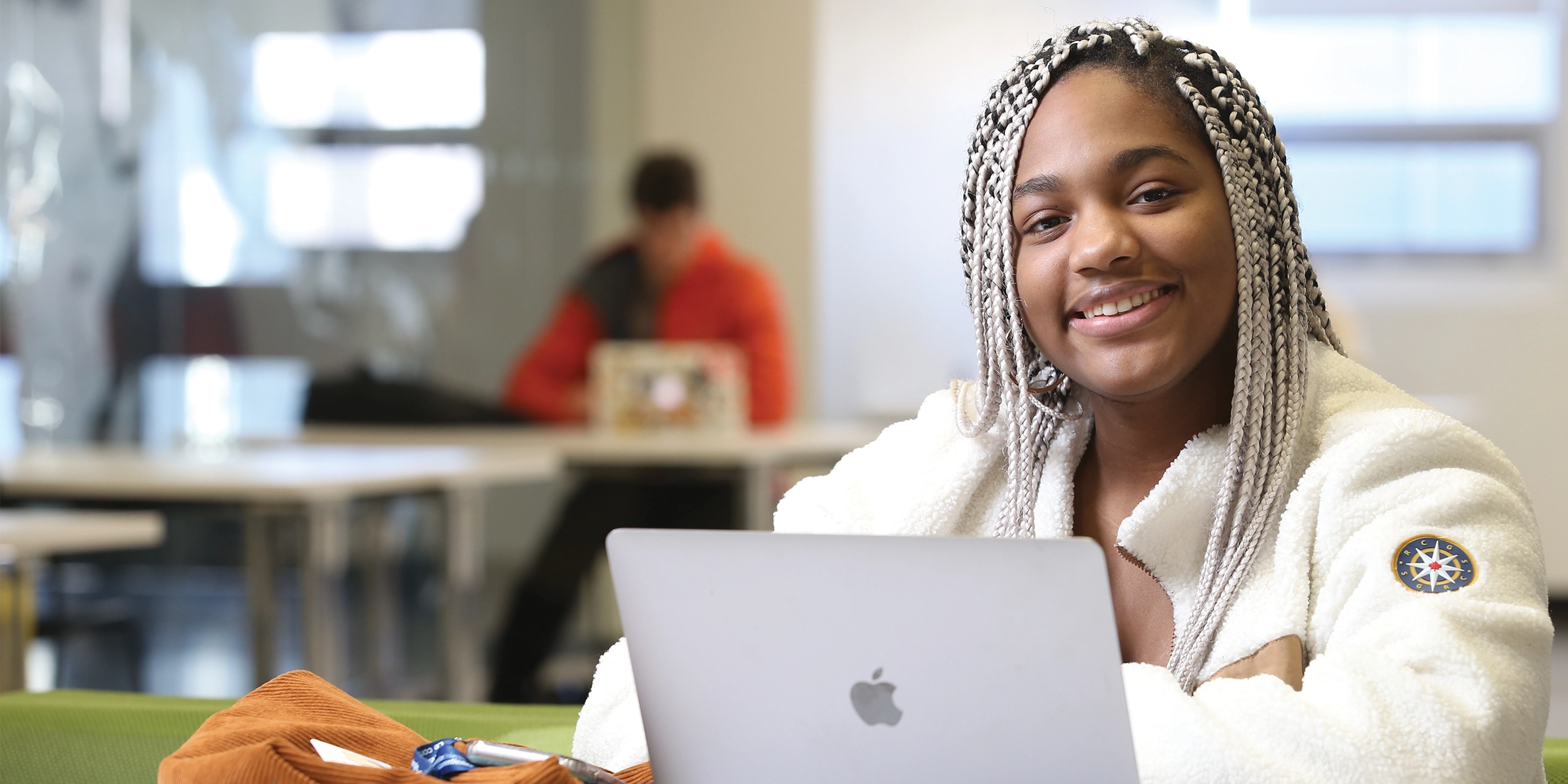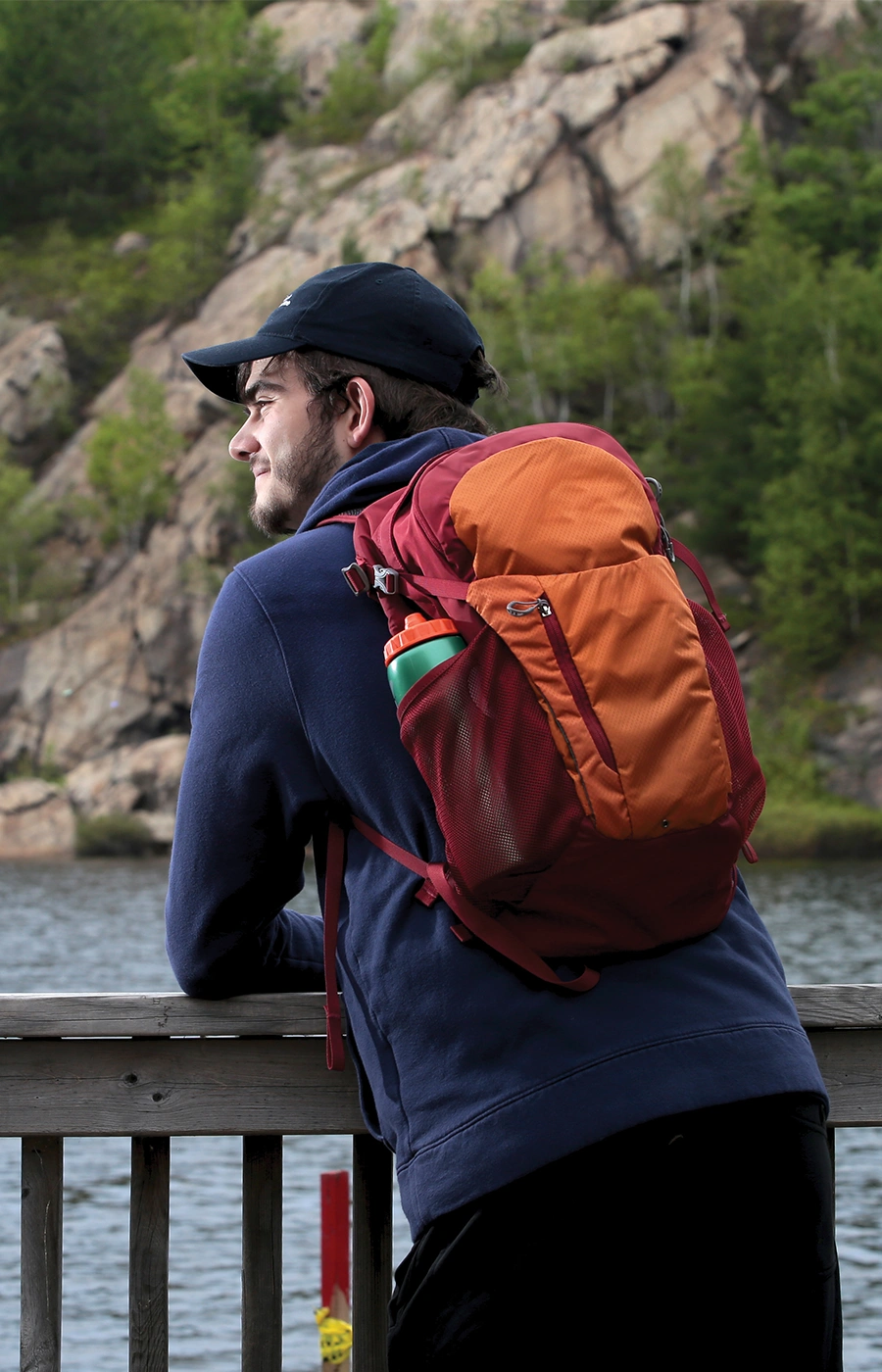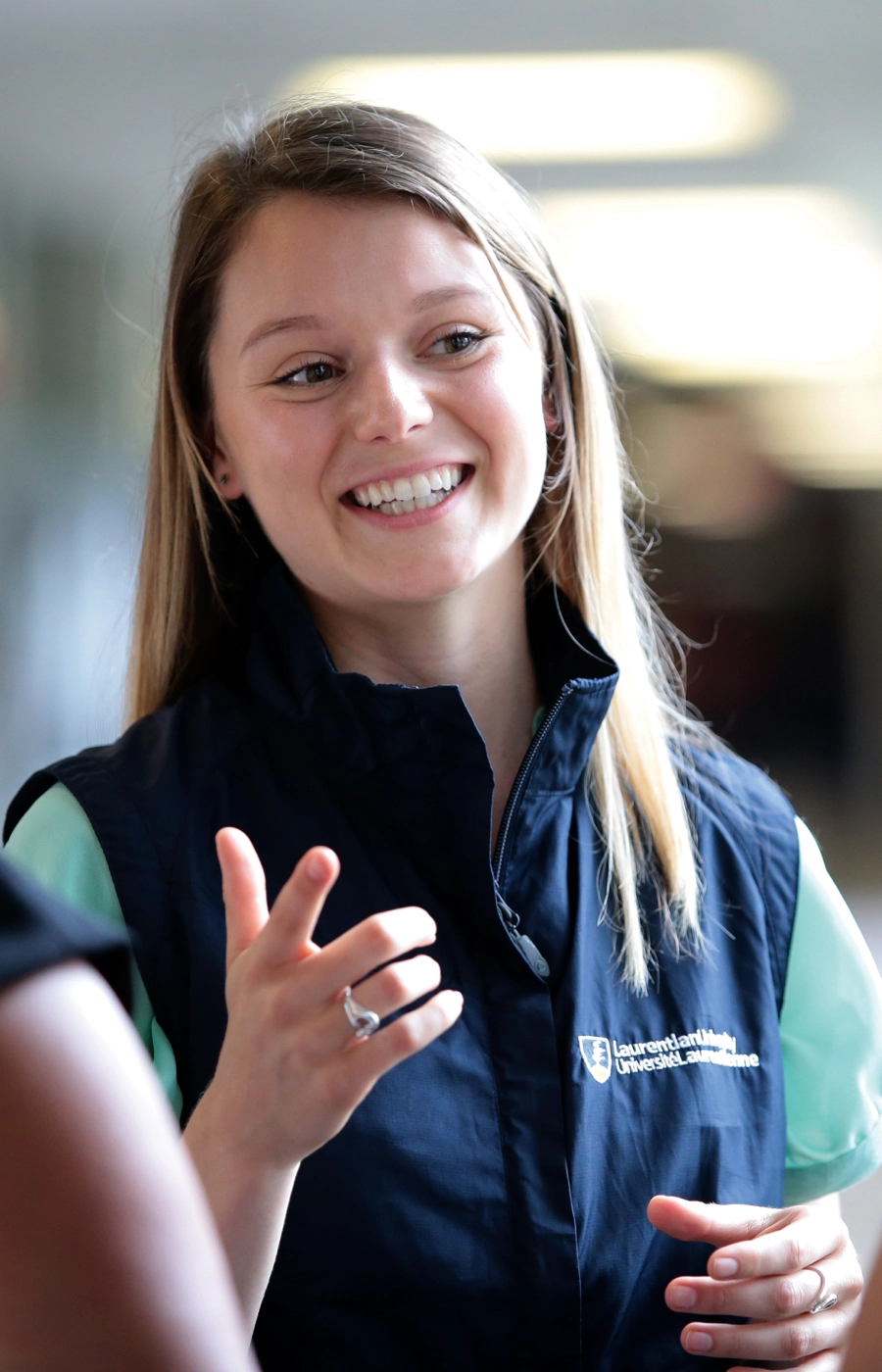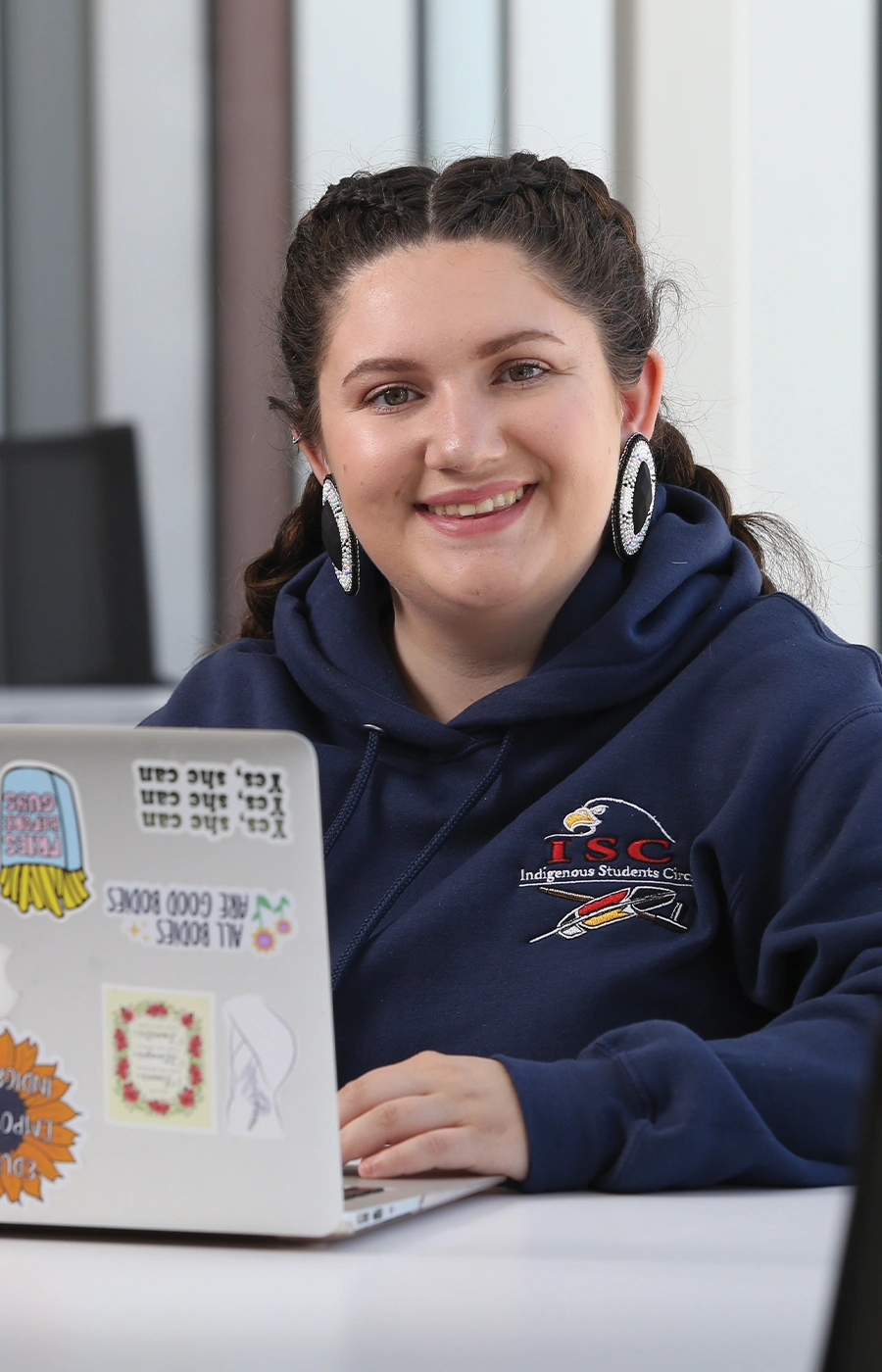
Health Promotion
Faculté d'éducation et de la santé
Are you interested in improving your community’s health and wellbeing?

Survol du programme
Become a leader in health and wellness with a well-rounded approach to community health and health education.
Learn the skills required for health promotion, health sciences, and teaching, with the ability to minor in the arts or sciences.
This program enables students to engage in practical and theoretical experiential learning to help develop their professional skills related to sport, physical education, Indigenous health and wellness, health and fitness professions. Students will also acquire leadership skills required for the promotion of a healthy and physically active lifestyle with a focus on promoting and developing physical fitness, education, coaching, rehabilitation, recreation and health initiatives.
Many courses are available in French.
Get hands-on training and academic credit with the Health Promotion without Borders program, while travelling to exotic locations like Kenya, Zambia, Zimbabwe, Mongolia, Costa Rica, and Ecuador.
Prepare yourself to coach, teach, develop, and promote sport and physical activity programs, or to pursue graduate studies in one of many related fields such as human kinetics, medicine, physiotherapy, occupational therapy, or chiropractic.
Learn how to create health-related programs to educate and benefit the community.
Perspectives de carrière
Health promoter, fitness consultant, teacher, registered kinesiologist or continue studies in medicine, chiropractic, naturopathic medicine, or pursue graduate studies in speech therapy, physical and occupational therapy or other areas.
*Can be taken in conjunction with the Concurrent Bachelor of Education.

I love that all parts of the Laurentian campus have fun and engaging things for students to take part in. For example, residence is constantly putting on events— there is hardly a weekend without something fun to do. Whether it be euchre nights, pumpkin carving, sports, boat cruises or bowling nights, there is always something to participate in. Although the events are fun, the friendships I have made through participating are even better. This contributes to my favourite aspect of the Laurentian experience, which is seeing at least one person I know everywhere I go. Whether it’s in class, at the gym, checking my mail or even in the Tim Horton’s line up, I always see a familiar face.
Amanda Dodaro, Health Promotion
Détails du programme
Langue du programme:
Anglais
Mode de présentation:
Sur campus
Coordonnées
Caroline Dignard(705) 675-1151 ext. 5172
B-256C, B.F. Avery Physical Education Centre Sudbury Campus
cy_dignard@laurentian.ca
Veuillez écrire à l’adresse courriel ci-dessus et notre équipe de recrutement vous répondra!
En savoir plus sur le programme
The main focus is to provide leadership skills required for the promotion of a healthy and physically active lifestyle with focus on counselling in physical fitness, nutritional awareness, stress management, environmental sensitivity and health-oriented self-discipline. This program took the leadership role in developing the health promotion Without Borders program that allows students to gain experiential learning in countries abroad and study international issues...students gain academic credit for their experiences and to date have volunteered with medics to Africa in Kenya, same World, same chance in Zambia, Howard Hospital in Zimbabwe, Mongolia, Costa Rica and Ecuador. All Health Promotion graduates will demonstrate knowledge in the areas of prevention of disease, health protection and health education. Students will have gained the skills required to develop, implement and evaluate health promotion programs. The program is also designed to provide students with the leadership skills required for the promotion of a healthy and physically active lifestyle with a focus on counselling in physical fitness, nutrition, stress management, awareness of environmental factors related to health and wellness and health-oriented self-discipline. Many courses are available in French.
Exigences d’admission
Ontario High School Applicants
Program Prerequisites:
- 1 grade 12 English U/M course; 1 grade 12 4U Chemistry; 1 grade 12 U Biology or Exercise Science; 3 additional grade 12 U/M courses
- A minimum overall average of 75% in the 6 best grade 12 U/M courses
In order to advance to the 2nd year of the program, the student must provide a photocopy of a current certificate in CPR (level C) and First Aid before February 28.
As part of their electives, students must complete a minimum of 6 credits of courses with a minimum of 50% Indigenous content.
Additional information for applicants who have completed Advanced Placement courses.
Additional information for applicants who have completed the International Baccalaureate.
Click here to view information regarding General Admission Requirements.
Applicants from outside an Ontario High School
Canadian High School Applicants from outside Ontario
Comment déposer une demande
Candidats canadiens
Si vous êtes citoyen canadien ou résident permanent, vous devez déposer votre candidature auprès du Centre de demande d'admission aux universités de l'Ontario (CDAUO).
Pour obtenir des instructions détaillées sur le processus de demande d'admission, veuillez consulter la page Comment déposer une demande: Candidats canadiens de premier cycle.
Candidats internationaux
Si vous êtes un candidat international, vous devez remplir le formulaire de candidature international.
Pour obtenir des instructions détaillées sur le processus de demande d'admission, veuillez consulter la page Comment déposer une demande: Candidats internationaux de premier cycle.
Options de diplôme
Health Promotion (120 credits)
Students must follow these regulations in order to meet graduation requirements.
This main focus of this program is to provide leadership skills required for the promotion of a healthy and physically active lifestyle as well as counselling in physical fitness, nutritional awareness, stress management, environmental sensitivity, and health oriented self discipline.
Program of Study
First Year:
PHED 0199E Outdoor School I
PHED 1006E Exercise Science, Wellness and Health
PHED 2307E Program Organization in Physical and Health Education
BIOL 2105E Human Anatomy and Physiology
PSYC 1105E Introduction to Psychology
3 credits in Chemistry
9 non-PHED elective credits
Note: In order to advance to the second year of the program, students must provide a photocopy of a current Certificate in CPR (level C) and First Aid before February 28.
Second Year:
PHED 0299E Outdoor School II
PHED 2206E Motor Learning + lab
PHED 2516E Musculoskeletal Anatomy + lab
PHED 2517E Musculoskeletal Anatomy + lab
PHED 3209E Therapeutic Exercise
PHED 3229E Gerontology and Exercise
PHED 3146E Health Promotion in the Corporate Setting
INTE 2526E Introduction to Ergonomics
STAT 2126E Introduction to Statistics
9 credits of electives
Third Year:
PHED 0399E Outdoor School III
PHED 3117E Traumatology for Physical Educators
PHED 3126E Physiology of Exercise + lab
PHED 3506E Health Education
(OR) PHED 3507E Community Health
PHED 3061E Exercise Psychology
(OR) PHED 4216E Sport Psychology
PHED 3136E Research and Professional Ethics in Kinesiology
(OR) PHED 3526E Health Policy
PHED 4547E Principles of Health and Disease
INTE 3556E Alternative Health
(OR) INTE 3546E International Health Education
9 credits of electives
Fourth Year:
PHED 3806E Functional Assessment
(OR) PHED 4006E Fitness: Evaluation and Prescription
PHED 4106E Adapted Physical Education + lab
PHED 4107E Human Development
PHED 4507E Nutrition
PHED 4516E Stress Management
(OR) PHED 4546E Mental Health and Wellness
PHED 4597E Health Promotion Seminar
PHED 4916E Health Promotion Internship
PHED 4094E Professional Certification
9 credits of electives
Certificate in Ecohealth Promotion (30 credits)
PHED 4094E Professional Certification
PHED 2149E Introduction to Outdoor Living
BIOL 1000E Canadian Environmental Biology
OR BIOL 1506E Biology I/BIOL 1507E Biology II
PHED 4246E Ecohealth Promotion
3 credits from:
PHED 2317E Risk Management in Sport and Physical Education
PHED 4446E Risk Management in Outdoor Environments
3 credits from:
PHED 2406E Introduction to Outdoor Education
PHED 2606E Outdoor Adventure Leadership
PHED 3236E Outdoor Facilitation & Team Building
6 credits from:
PHED 3506E Health Education
PHED 3507E Community Health
PHED 3146E Health Promotion in a Corporate Setting
PHED 4447E Recreational to Therapeutic Adventure
1.5 credits from:
PHED 2109E Wilderness Travel
PHED 2329E Cross-Country Skiing
PHED 2159E Canoe Tripping Leadership
PHED 2259E Minor Games
PHED 3059E Practicum - Health Promotion
PHED 3209E Therapeutic Exercise
PHED 3229E Gerontology and Exercise
PHED 3049E Outdoor School Leadership
PHED 4209E Winter Wilderness Travel
3 credits from:
BIOL 2356E Principles of Ecology + Lab
PHED 3051E Human Environmental Physiology
PHED/INTE 3546E International Health Education
PHED/INTE 3556E Alternative Health
PHED 3906E Outdoor Adventure Leadership Internship
PHED 4106E Adaptive Physical Education
PHED/INTE 4457E Introduction to Therapeutic Adventure
PHED/INTE 4507E Nutrition
PHED/INTE 4516E Stress Management
PHED 4546E Mental Health and Wellness
PHED 4547E Principles of Health & Disease
PHED 4706E Independent Study I
PHED 4716E Independent Study II
PHED 4916E Health Promotion Internship
PHED 4597 Health Promotion Seminar
Academic Regulations
To be in good academic standing in the School of Kinesiology and Health Sciences, the student must:
1) satisfy all conditions of admission;
2) not fail more than 3 credits in an academic year or in the previous 30 credits;
3) maintain a cumulative overall average of at least 4.0 on all courses taken.
A student who fails to attain good academic standing may be allowed to continue on probation for no more than one year (or 30 credits). If after one probationary period, the student does attain good academic standing, he or she may proceed in program. However, if after the probationary period, the student fails to attain good academic standing, he or she must withdraw from the School of Kinesiology and Health Sciences, but may apply to transfer to another program at the university.
A student who fails over 6 credits in the 1st-year of program may not proceed to upper year PHED courses.
After one calendar year, a student who has been asked to withdraw from the program may petition the Senate Committee on Academic Regulations and Awards for readmission, but such measures should have the recommendation of the academic unit before being considered by the Senate Committee.6
Exemples de cours
This course is an introduction of basic concepts of fitness assessment, training methods and testing procedures. A combination of theory and practical experiences in effects of lifestyle on fitness, weight-training principles and methods, sport preparation, flexibility, circuit training, post-cardiac program, fads, etc. (lec 3, lab 1.5) cr 3.
This course examines the nature and scope of physical education as a profession including a descriptive analysis of current sport and physical education structures, practices and issues. (lec 3) cr 3.
This course is a survey of contemporary psychology with reference to its historical development and emphasis on its present status and scientific methodology. It examines the biosocial bases of behaviour, development and personality, motivation, emotion, perception and learning. It involves scaling of behavioural variables, some descriptive statistics, and some elementary experiments and other practical work. (lec 2, lab/tut 1) cr 6. Prerequisite to all other PSYC courses. Students must achieve a minimum 60% grade to continue in a Psychology program.
This course is completed prior to the start of classes. It is designed to introduce the student to their peers, program, school, and the university. It provides an introduction to a selection of outdoor group and challenge activities including cooperative games and basic outdoor skills. Students are required to pass a basic aquatics skill test. Sem, Field Work (cr. 0)
This course is a study of human movement using the methods of mechanics. The mechanical properties of the human body segments are investigated and a variety of movements are analyzed in terms of temporal, positional, velocity, acceleration and force patterns. The understanding and the improvement of human movement are stressed. (lec 3, lab 2) cr 3.
This course is an introduction to concepts and models developed to explain perceptual-motor behaviour, motor skill learning and motor control. Cognitive, psychological and neuromotor factors responsible for the skilled execution of movement are covered. The utilization and application of this knowledge through discussion and laboratory experiences are stressed. PREREQ: PSYC 1105, PHED 1507 or BIOL 2105. (lec 3, lab 2) cr 3.
This course provides an introduction to basic statistical concepts and techniques that are common to all disciplines in the social sciences. The principal topics include: data collection and description, the characteristics and features of the normal probability distribution, the formulation and testing of hypotheses, linear correlation and regression analyses. (lec 3) cr 3. Students may not retain credit for both STAT 2126 and STAT 1056, or any other introductory statistics course.
This course is completed early in the fall semester. The course is designed to introduce students to a variety of outdoor-related experiences. Students participate in a series of on-campus water and land-based outdoor activities over several days in order to develop a foundation of knowledge and skills for each type of activity. The course focuses on building the precursory skills required for participation in Outdoor School III. PREREQ: PHED/EDPH 0199, current CPR First Aid/CPR certification, basic aquatics skill test. Sem, Field Work (cr 0)
This course describes and analyses structure and function of the osseous, articular, muscular, and nervous tissues of the human body. Lectures will focus on the examination of regional musculoskeletal and nerve structures and their involvement in kinematics and dynamic muscle actions in physical activity. PREREQ: BIOL 2105 (lec 3, lab 2) cr 3. A series of labs are designed to accompany this course. Students must enroll and participate in lab exercises in order to receive credit for this course.
This course provides students an in-depth understanding of the physiologic aspects of the systems related to the study of human health and movement. Discussions will focus on integrated physiologic regulations and processes that allow the human body to cope with stress and adjust to internal and external changes. PREREQ: BIOL 2105 EL (lec 3, lab 2) cr 3. A series of labs are designed to accompany this course. Students must enroll and participate in lab exercises in order to receive credit for this course.
This course is a study of the effective application of organizational and administrative principles to program and event planning in physical education, sport and recreation. Consideration is given to educational sport and recreation systems as well as the planning and organization of events for amateur sport and recreation groups. Students are expected to complete projects that involve working with a member of the Laurentian or Sudbury sport or recreation community to organize an event. (lec 3) cr 3.
This course is a study of the etiology and nature of the injuries that occur during physical activities, with emphasis on prophylaxis and non-medical management. PREREQ: PHED 1506/7 or BIOL 2105 and 2506/7 or or PHED 2516/2517. (lec 3) cr 3.
This course deals with the study of the qualitative and quantitative effects of various types of exercises on the systems of the body. Special consideration is given to the body's adaptive ability to the stress of exercise. The physiological basis for the appraisal of fitness is also considered. PREREQ: PHED 2506/7 or PHED-2516/2517(may be taken concurrently). (lec 3, lab 2) cr 3.
This course is designed to provide the students with fundamental knowledge required to understand, implement and promote the principles of physical, emotional, social, intellectual, spiritual and occupational dimensions of health and wellness education in a variety of settings. From health education emerges healthy behaviour which is an important determinant of personal, community and global health. Health education as it relates to the development and implementation of planned learning experiences, the motivation to change attitude and influence behaviour in academic and informal group education settings will be discussed. PREREQ: PHED 2506/7. (lec 3) cr 3.
This course applies psychological theories and techniques to the domain of competitive sport. It attempts to determine and understand the psychological demands on athletes, coaches, spectators and parents. Topics include assessment of personality, aggression, motivation, attentional focus, activation, anxiety, attribution, group interactions, and leadership. Mental skills training for use in sport environments is introduced. PREREQ: PSYC 1105. (lec 3, lab 2) cr 3.
This course consists of an immersive multi-day wilderness canoe trip. The trip is peer-led by fourth-year students from the Outdoor Adventure Leadership program. Students acquire applied (experiential) wilderness canoe tripping skills including canoeing, portaging, fire building, camp cooking, and shelter/tarp set up. PREREQ: PHED/EDPH 0299, current CPR First Aid/CPR certification, basic aquatics skill test. Sem, Field Work (cr 0)
This course covers the theory of exercise and physical activity participation. Emphasis is placed on the analysis and application of theoretical knowledge to understand and respond to challenges encountered in exercise psychology and physical activity promotion. Lec. 3cr. Prerequisite: PSYC 1105 or permission from the Professor.
This course presents the basic concepts of stress and provides information on the causes and effects of this pervasive phenomenon. Both assessment techniques and coping skills are introduced. The purpose of the course is to provide the student with the knowledge and skill to deal with stress effectively. (lec 3, lab 1) cr 3.
The primary purpose of the course is to expose students to various mental health issues and common disorders within the mental health spectrum. Methods and intervention skills will be addressed to promote positive mental health and wellness within a variety of populations. Mental and emotional problems will be studied and treatment protocol examined with emphasis placed on the relationship to exercise and physical activity. Concepts of self-esteem, communication skills, and spiritual well being will be viewed to foster self awareness. The student will be exposed to a variety of mental health resources and various helping professions will be studied. Opportunities for various certifications will be made available to the student who wishes to broaden his/her focus in the mental health field. PREREQ: PHED 2506/7 and PSYC 1105. (lec 3) cr 3.
This course will introduce a variety of mental training techniques and interventions. The instructor will discuss both the theory and the practical applications of each technique. Students will learn to identify when specific techniques should be prescribed and will practice program design and implementation. Evaluation techniques will be reviewed. PREREQ: PHED 4216 (minimum 60%). (lec 3) cr 3. Open only to Sports Psychology majors or with instructor's permission.
Membres du corps professoral
Prêt(e) à passer à la prochaine étape?
Nous sommes là pour vous aider à commencer votre parcours à Laurentienne.



